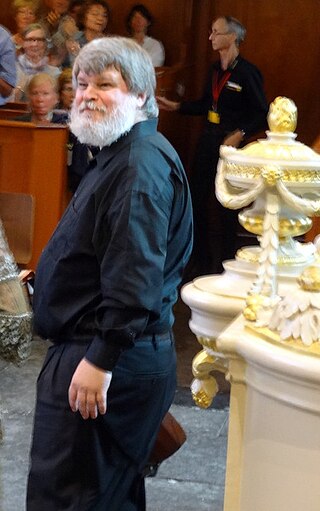Andrew Lawrence-King (born 3 September 1959) is a harpist and conductor from Guernsey known for his work in early music.
Contents

Andrew Lawrence-King (born 3 September 1959) is a harpist and conductor from Guernsey known for his work in early music.

Lawrence-King received an organ scholarship to Selwyn College, Cambridge, following on his work as head chorister at the Cathedral and Parish Church of St Peter Port Guernsey. [1] [2] Lawrence-King taught himself the techniques of early harp performance after acquiring an early harp, emphasizing a heavily improvisational style. [2] After Selwyn, he attended the London Early Music Centre, subsequently becoming an ensemble continuo player with various groups in Europe and a harp soloist with Hespèrion XX. In addition to his work with other ensembles, Lawrence-King founded continuo group Tragicomedia which he co-directed with Stephen Stubbs from 1988 to 1994, the year he founded The Harp Consort, which performs internationally and releases recordings on Harmonia Mundi.
Lawrence-King has worked as a conductor with a number of ensembles, including conducting at the 400th anniversary of the earliest opera at the Getty Center in Los Angeles (2001). He has served as senior visiting research fellow for the Australian Research Council Centre of Excellence for the History of Emotions, studying baroque opera performance customs of the 17th century alongside professor Jane Davidson of the University of Western Australia and as professor of harp and continuo at the Akademie für Alte Musik in Bremen. [2] [3] [4]
In 1992, he received the Erwin Bodky Award from the Cambridge Society for Early Music in Massachusetts. [5] In 1996, his recording of Alcina brought him the American Handel Society Prize. [2]

Dame Carolyn Emma Kirkby, is an English soprano and early music specialist. She has sung on over 100 recordings.

The Taverner Choir, Consort and Players is a British music ensemble which specialises in the performance of Early and Baroque music. The ensemble is made up of a Baroque orchestra, a vocal consort and a Choir. Performers place emphasis on a historically informed performance practice and players work with restored or replicated period instruments.

Andrew Manze is a British conductor and violinist, noted for his interpretation of Baroque violin music.

Hille Perl is a German virtuoso performer of the viola da gamba and lirone.
Lynne Dawson is an English soprano. She came to great prominence through her performance as a soloist in Libera me from Verdi's Requiem with the BBC Singers at Princess Diana's funeral in September 1997. Lynne Dawson has recorded over seventy-five CDs and has a varied concert and operatic repertoire.

Paul Raymond O'Dette is an American lutenist, conductor, and musicologist specializing in early music.
Daniel John Taylor, is a Canadian countertenor, conductor and early music specialist. Taylor directs the Trinity Choir, the Theatre of Early Music and is Professor of Opera, Voice and Early Music at the University of Toronto.
The Harp Consort is an international early music ensemble directed by Andrew Lawrence-King, specialising in Baroque opera, early dance-music, and historical World Music.
Maurice Steger is a Swiss recorder player and conductor, mostly in Baroque music.
Al Ayre Español is a vocal and instrumental ensemble specialized on early music founded in 1988 by harpsichordist Eduardo López Banzo.
Quadriga Consort aka Quadriga Early Music Band is an early music ensemble from Austria. Founded in 2001 by harpsichordist Nikolaus Newerkla, the ensemble plays rearranged early British and Irish traditional music performed on period instruments.
John Butt is an English orchestral and choral conductor, organist, harpsichordist and scholar. He holds the Gardiner Chair of Music at the University of Glasgow and is music director of the Dunedin Consort with whom he has made award-winning recordings in historically informed performance. He is a prolific scholar, conductor and performer of works by Johann Sebastian Bach.
Cormac MacDermott, Irish harper and composer, was one of the best-known Irish harpers and a member of the "Royal Musick" at the English court of James I. He was the only Irish composer at this period known to have written in a European Renaissance art music idiom.

Tim Mead is an English countertenor.

The Concerti grossi, Op. 3, HWV 312–317, are six concerti grossi by George Frideric Handel compiled into a set and published by John Walsh in 1734. Musicologists now agree that Handel had no initial knowledge of the publishing. Instead, Walsh, seeking to take advantage of the commercial success of Corelli's Concerti grossi, Op. 6, simply combined several of Handel's already existing works and grouped them into six "concertos".
lautten compagney BERLIN is a German instrumental ensemble based in Berlin. Founded in 1984 by Hans-Werner Apel and Wolfgang Katschner, now the principal conductor, it specializes in early music and Baroque music, notably the operas of Handel.

Missa Mexicana is a studio album by international Early Music ensemble The Harp Consort. It was released in October 2002 under Harmonia Mundi, HMX 2907293. It juxtaposes a mass setting by Juan Gutiérrez de Padilla with Latin American and African folk dances that inspired it.

Joel Frederiksen is an American bass singer and lutenist based in Germany, and director of the early music Ensemble Phoenix Munich. He has released award-winning CDs with Harmonia Mundi France and SONY/Deutsche Harmonia Mundi. He studied for a master's degree in Early Music at Oakland University where he was the recipient of numerous awards including "Distinguished Musicianship", "Matilda Award" and the "Distinguished Alumni Achievement Award". From 1990 to 1999 while living in New York City he was a member of the Waverly Consort and the Boston Camerata.
Jill Feldman is an American soprano who has acquired an international reputation for her interpretation of medieval, baroque and classical repertoires.
La Nuova Musica is an early music ensemble based in the United Kingdom that was founded in 2007 by countertenor David Bates.